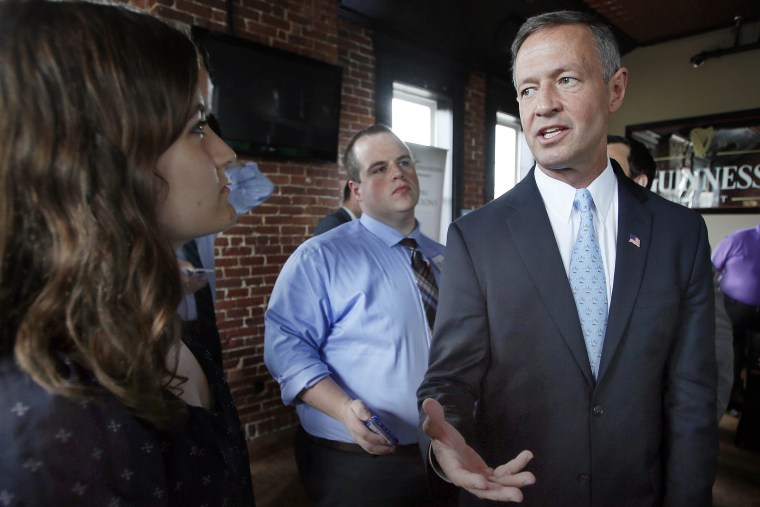Even though months of groundwork in Iowa and New Hampshire have so far not paid dividends in the polls for Democratic presidential candidate Martin O'Malley, he and his team insist they don’t sweat the rise of Sen. Bernie Sanders and the continued strength of Hillary Clinton.
Despite O’Malley’s strong progressive resume, the former two-term governor of Maryland is the first choice of just 2% of national Democrats, according to the most recent NBC News/Wall Street Journal poll. And he’s not doing much better in early state rankings, where many Democrats have still not heard of him.
O’Malley was supposed to be the liberal alternative to frontrunner Clinton, but he’s seen Sanders snatch that mantle in recent weeks and consolidate support among progressives’ wing of the party with giant rallies in liberal locales. The dynamic leaves O’Malley with little room to move up and, at least for the moment, an unclear path to relevance, let alone victory.
RELATED: O'Malley rolls out sweeping debt-free college plan
Despite all that, team O’Malley maintains he’s right where he needs to be, on pace for a slow-burn success. They see Clinton as weaker than expected and Sanders as a passing fad. Liberals may want to have a fling with the Democratic socialist from Vermont, but will settle down with the proven executive from Maryland.
This is how O’Malley thinks he can win the Democratic nomination.
“We’re doing exactly what we want to do,” O’Malley’s top strategist Bill Hyers told msnbc in an interview. Hyers managed New York City Mayor Bill de Blasio’s come-from-behind campaign and says O’Malley has plenty of time to enact his own upset in Iowa’s February Caucuses.
Many voters don’t really start deciding until six weeks out from elections, Hyers says, so O’Malley’s surge can come “as late as two-weeks out” from the Iowa Caucuses.
Between now and then, he’s laying the groundwork with a strategy that couples small events with big ideas. His aides see O’Malley as the best retail politician in the field and he’ll spend the next seven months doing the unglamourous, but valuable work of introducing himself to as many people as possible.
O’Malley called it his “summer of introduction” on Baltimore radio station WBAL this week, acknowledging that despite his all of his efforts, he’s still largely unknown.
Success comes to those who put in the work and “grind it out,” according to team O’Malley. They point to the precedent of candidates like Rick Santorum, who pulled out a narrow upset win in the 2012 GOP Iowa caucus after stumping across the state in a pick-up truck, and those of John Edwards in 2004 and Dick Gephardt in 1988, who bout outperformed expectations in Iowa (though Edwards came in second).
Meanwhile, O’Malley is earning praise from wonkier progressives like the Progressive Change Campaign Committee by rolling out ambitious policy like a debt-free college plan, one to convert the country 100% clean energy, and a new call for a crackdown on Wall Street unveiled Thursday. He hopes ideas like these will win over progressives when they give him a second (or first) look down the road.
While Sanders has taken up the lane O’Malley hoped to occupy, the governor’s team says they think Bernie-metum could actually work to their advantage. Sanders has scrambled the race and shown that Clinton is not the inevitable nominee -- the first challenge for any serious rival to the frontrunner.
“I’m a huge fan of it simply because it would have been hard if the press just weren’t covering the race at all,” said Hyers. “Now there’s a race ... It’s gone from a massive advantage [for Clinton] to where we’ve all got to scrap it out.”
“Having lived through Howard Dean myself, and other folks like this, the job is not to win the July caucuses, it’s to win the February caucuses,” continued Hyers. “When it comes push to shove of who do I want to be president of the United States, these voters take it seriously” and O’Malley’s executive experience will win out, Hyers added.
And O’Malley told WBAL that history shows that the candidate who peaks in time for the caucuses is “not the candidate who is peaking in June."
